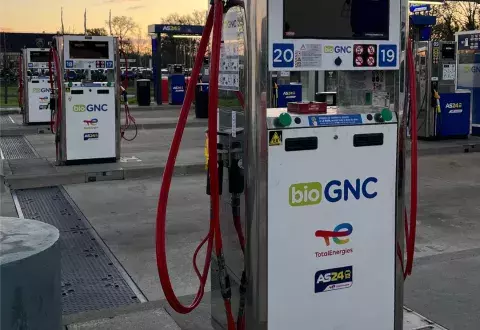
AS 24, A EUROPEAN DISTRIBUTION NETWORK FOR CNG AND BIO-CNG, AN ALTERNATIVE ENERGY SOURCE FOR TRANSPORTERS.
AS 24 offers a diversified multi-energy range, in particular through the availability of compressed natural gas and biogas at its HGV stations in France and Europe.

To provide better support for transport professionals, TotalEnergies and AS 24 are combining their networks to offer a multi-energy service, with CNG and bio-CNG stations optimised to meet customer needs and cross-acceptance of cards.
TotalEnergies and AS 24 cards are accepted on both networks to ensure wider coverage of rapidly operational CNG and bio-CNG stations for all users.
When AS 24 and TotalEnergies customers in France fill up with CNG, it includes at least 50% biomethane from renewable sources. Our customers can also opt for 100% bio-CNG.
AS 24 and TotalEnergies plan to be operating 50 NGV stations in France by 2027. All these stations (excluding Mulhouse Sausheim) offer 100% bio-CNG to support our customers in their transition to low-carbon energy sources.
With AS 24, filling up with CNG and bio-CNG is quick and easy.
You get:
Image

Competitive prices. | Image

Refuelling lanes suitable for HGVs. | Image

Optimised distribution for professionals, with fast filling times and a choice of NGV1 or NGV2 nozzles. |
CNG or Compressed Natural Gas is a mixture of light hydrocarbons stored at high pressure. It is derived from natural gas naturally occurring in porous rocks and composed mainly of methane.
CNG is a fuel used for all vehicles (from light vehicles to HGVs). This means that transport professionals will find that many types of engine are compatible.
Bio-CNG is biomethane produced from organic waste. It is the renewable version of CNG, for even more sustainable mobility. The volumes of bio-CNG distributed to French stations in the AS 24 / TotalEnergies network are linked to certificates of guaranteed origin from French biogas plants.
WHAT ARE THE ADVANTAGES OF CNG AND BIO-CNG?
More than ever, the momentum of energy transition is gaining ground. This is reflected in activities and measures to reduce emissions of pollutants and greenhouse gases.
This is a European, national and local initiative, with communities increasingly involved in cleaner energy.
To improve air quality, all public stakeholders are committed to reducing emissions of nitrogen oxides (NOx) and particulate matter.
With very low levels of particulates and less nitrogen oxide (NOx) than diesel, HGVs and commercial vehicles running on CNG/bio-CNG have all met the current standard since 1 January 2014: EURO VI for HGVs and EURO 6 for commercial vehicles. Vehicles running on CNG/bio-CNG qualify for the Crit’air 1 sticker.
While a CNG or bio-CNG vehicle is more expensive to buy, it can turn out more cost-effective than diesel or petrol, depending on the fuel price, distance driven and the applicable taxes.
CNG and bio-CNG vehicles have half the noise level of diesel HGVs. An advantage when travelling through cities or by night.
The range of CNG/bio-CNG vehicles offered by manufacturers is 300 to 1,000 km for HGVs, with performance comparable to conventional fuels.
TIPS FOR USE
CNG and bio-CNG are no more hazardous than diesel or petrol. All connections are sealed without any risk of fumes or splashes. Of course, as with other fuels, it is essential to follow the safety instructions.
Filling up with CNG and bio-CNG is different from filling up with diesel, but just as easy. Just change a few habits! To support drivers and help them become familiar with the new refuelling procedure, instructions are provided on the side of the volumetric pump.

Stop the engine

Do not smoke or bring a source of heat near to the vehicle

Do not use your phone

Only fill permitted tanks

Never use an adapter between the tank and the nozzle